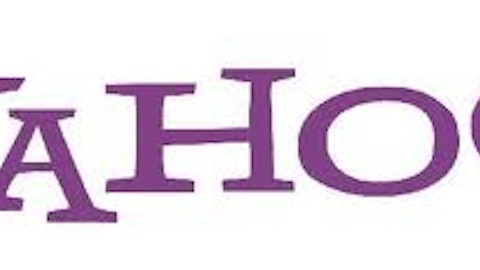athenahealth, Inc (NASDAQ:ATHN) is an electronic medical records (EMR) company at its core. It provides billing software and health records software to medical organizations big and small. Last year, it had purchased Epocrates, a quasi-social media company that makes a nifty smartphone app that most healthcare providers carry in order to look up prescribing information and get medical alerts.
Despite the promise implied by the Epocrates acquisition, this article aims to make the case for Athenahealth being an overvalued company that may ultimately fail given the current trends in its industry.
The good
In the short-term, athenahealth, Inc (NASDAQ:ATHN) seems to be doing well, especially since it is growing revenue at a good pace (more than 30% year over year). This is due to Uncle Sam providing incentives to health care providers in order to meet something called “meaningful use.” The term “meaningful use” is a moving target and the purveyors of electronic medical records are cashing in on the adoption of their systems.
Athenahealth will benefit from the adoption of its systems and the maintenance fees associated with continued use. The challenge is to stay ahead of the changes and have enough support personnel to implement any changes needed. athenahealth, Inc (NASDAQ:ATHN) has fewer than 2,400 employees and it seems they are doing a good job of keeping them happy, but there are a lot of companies in this space and the skills needed in this industry take some time to build.
As a comparison, Allscripts Healthcare Solutions Inc (NASDAQ:MDRX) has more than 7,000 employees, and a market cap similar to Athenahealth. Allscripts’ market cap is around $2.5 billion, while Athenahealth’s is around $3 billion. Allscripts, though, has revenue more than three times higher than Athenahealth. Those extra employees are paying off for Allscripts, and even though the growth last quarter was not great, the future looks bright. Allscripts’ dbMotion has been adopted by a non-profit health system from Toledo, Ohio. ProMedica has 1,700 physicians and the system will allow a transition to a better optimized Accountable Care Organization (ACO).
If Athenahealth can leverage Epocrates and its flagship Anodyne product, it should catch up with Allscripts and its dbMotion product, and that is why investors are willing to pay 193 times earnings or so, and an estimated forward P/E of 58. It’s all about the growth potential. Allscripts has not been growing and Mr. Market hates that.
There are significant switching costs to adopting another EMR system. You have to migrate your data to the new system and you have to integrate your billing system and other systems. There is a moat here, but the moat is not filled with alligators. There are choices out there and the next few months will be critical since the Patient Protection and Care Act (PPCA) is scheduled to be implemented fully in 2014.
The bad
athenahealth, Inc (NASDAQ:ATHN) competes in a crowded field. Competition is coming from small start-ups as well as more established players. One example is General Electric Company (NYSE:GE). GE sells a full suite of EMR and billing products that compete directly with Athenahealth. GE Healthcare brought in more than $18 billion in revenue. This includes a variety of products, and GE is by no means a pure play in this sector, but EMR systems represents an area of potential high growth within the division.
Athenahealth has debt of around $105 million and cash on hand of about $48 million according to Yahoo! Finance. It pays no dividend, while GE pays a fairly generous 3.30% yield and a reasonable P/E of around 17. GE may not be a pure play in the sector, but you get less risk with some exposure in the space.
The ugly
The EMR space is just begging for a disruptive technology that will make it palatable to healthcare providers. No company makes a product that really caters to healthcare providers. The typical healthcare provider doesn’t want to sit around typing into a computer or iPad. Healthcare providers want to use their time more effectively than that, since they are being squeezed with lower reimbursements by third-party payers. Patients absolutely hate when you don’t pay attention to them and instead constantly stare at a computer screen; I don’t blame them.
There are a number of new companies that are offering free cloud-based EMR systems. Practice Fusion promises that it will always be free to healthcare providers. It hopes to make money by selling ads. I have personally tried Practice Fusion’s EMR system and Athenahealth’s EMR system, and despite some glitches on occasion, it is at least as good as anything offered by athenahealth, Inc (NASDAQ:ATHN) for the average small practice struggling with increasing overhead costs.
If you can get the system for free and qualify for “meaningful use,” then that works for the average solo practitioner. Practice Fusion is cloud-based in its entirety which makes it attractive to people who practice at multiple locations.
Hypothetically speaking, if a certain internet company that happens to make most of its revenue from selling ads on the internet would enter the EMR space, that would be a game-changer. Healthcare providers are looking for some company with a superior user interface to come in and disrupt and innovate. Such disruption could spell certain doom for most EMR suppliers. I don’t see how Athenahealth could really survive that.
The only potential upside to such a scenario is that it could be a takeover candidate, and as such, it would definitely command a premium.
Bottom line, short-term, there is a lot of competition in the space, but athenahealth, Inc (NASDAQ:ATHN) has held its own. Long-term, though, the potential for an innovator to come in and disrupt makes it a shaky investment, especially at its current valuation.
Erick Santos, M.D., Ph.D. owns shares of General Electric Company. The Motley Fool recommends Athenahealth. The Motley Fool owns shares of General Electric Company.
The article This Company Is Facing Some Serious Long-Term Challenges originally appeared on Fool.com.
Copyright © 1995 – 2013 The Motley Fool, LLC. All rights reserved. The Motley Fool has a disclosure policy.



